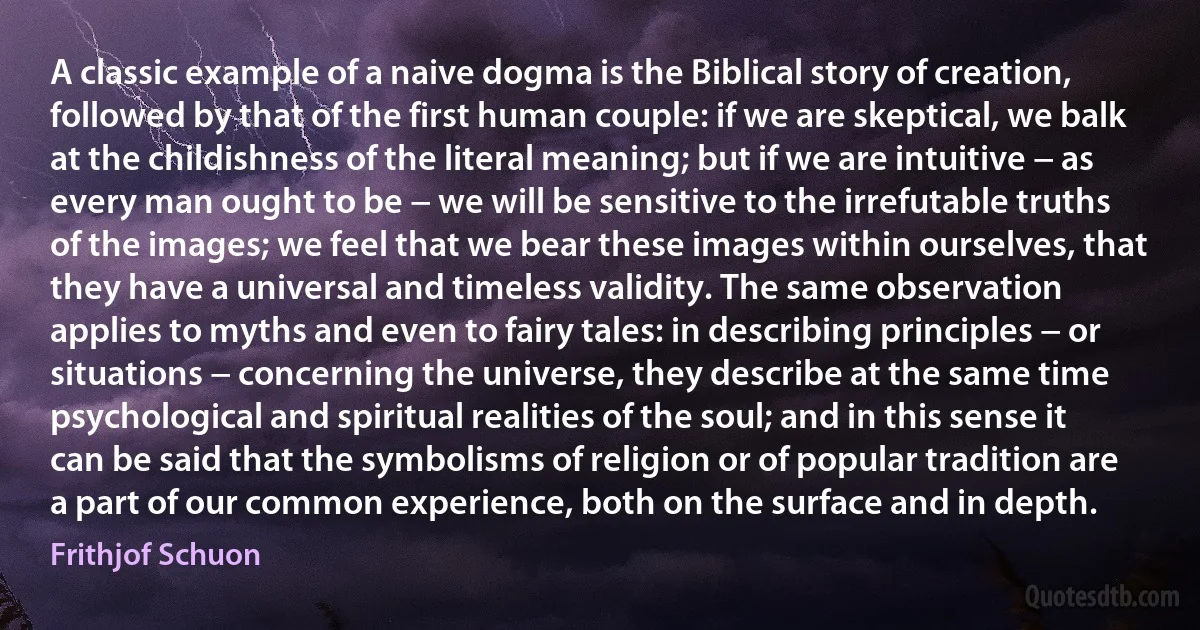
A classic example of a naive dogma is the Biblical story of creation, followed by that of the first human couple: if we are skeptical, we balk at the childishness of the literal meaning; but if we are intuitive − as every man ought to be − we will be sensitive to the irrefutable truths of the images; we feel that we bear these images within ourselves, that they have a universal and timeless validity. The same observation applies to myths and even to fairy tales: in describing principles − or situations − concerning the universe, they describe at the same time psychological and spiritual realities of the soul; and in this sense it can be said that the symbolisms of religion or of popular tradition are a part of our common experience, both on the surface and in depth.
Frithjof SchuonRelated topics
bear childishness common couple depth example experience human intuitive literal man meaning ought religion say sense sensitive soul story surface tales time timeless universal validityRelated quotes
For many years he had suffered from consumption, aggravated perhaps by his work of glass polishing. On Sunday, February 21, 1677, the end came unexpectedly, and almost suddenly. ...
Credit must be given to Colerus [John Kohler]... for his downright contradiction of the tales concerning Spinoza's death-bed which were circulated, it would seem, by persons who thought it would tend to edification to represent Spinoza as the blustering infidel of popular orthodox polemics, who is invariably assailed by doubt and disquietude in his last moments, and as invariably strives to disguise them with feeble bravado. Colerus very honestly says that the people of the house... knew nothing of any such matters, and did not believe a word of them.

Baruch Spinoza
Far too often, Christians have accepted the common secular view that we are the masters of animals, their rulers or owners - utterly forgetting that the dominion promised to humanity is a deputized dominion, in which we are to stand before creation as God's vice-regents, putting into effect not our own egotistical wants but God's own law of love and mercy. And yet, when one begins to challenge our despotic treatment of animals - whether killing for sport, the ruthless export trade, or (to take the latest example) the quite obscene slaughter of thousands of seals for their penises, to be sold as aphrodisiacs in Europe and Asia - again and again, one has to face this humanistic dogma: If it benefits humanity, it must be right.

Andrew Linzey
Certain it is, that any supposed obstructions, concerning the quality or temperature of any or every one of those worlds, could not have been any bar in the way of God Almighty, with regard to his replenishing his universal creation with moral agents. The unlimited perfection of God could perfectly well adapt every part of his creation to the design of whatever rank or species of constituted beings, his Godlike wisdom and goodness saw fit to impart existence to; so that as there is no deficiency of absolute perfection in God, it is rationally demonstrative that the immense creation is replenished with rational agents, and that it has been eternally so, and that the display of divine goodness must have been as perfect and complete, in the antecedent, as it is possible to be in the subsequent eternity.

Ethan Allen
Take a look at the simplest of objects. Let's take, for example, an old chair. It seems like nothing. But think of the universe comprised within it: the sweaty hands cutting the wood that used to be a robust tree, full of energy, in the middle of a luxuriant forest by some high mountains. The loving work that built it, the joyful anticipation of the one who bought it, the tired bodies it has helped, the pains and the joys it must have endured, whether in fancy halls or in a humble dining room in your neighbourhood. Everything, everything shares life and has its importance! Even the most worn down of chair carries inside the initial force of the sap climbing from the earth, out there in the forest, and will still be useful the day when, broken into kindling, it burns in some fireplace.

Antoni Tàpies
These classic models are everywhere mirrored in all universal systems, and in each they are the ideals from which all varieties and versions of themselves constantly emerge. They are, then, the source of all phenomenal life and represent the inner structure behind all life forms. They do not produce copies of themselves, however, but new creative eccentricities which, in turn, alter the models. They also appear as the biological working models of the genes and chromosomes, and they can be affected and changed at any time through mental experience. they are, in fact, instantly responsive to mental and psychic events, through the natural interchange between the psychological model accepted by the focus personality, and the reflections of that model through the entire body structure.

Robert Butts
